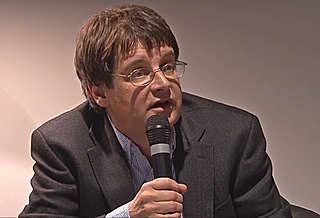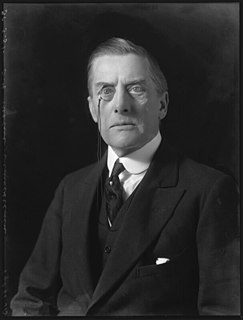A Quote by Joseph Stalin
Many understand "state socialism" in this way. Sometimes a system is concealed behind this term in which the capitalist state, in the interests of preparation for the conduct of war, takes upon itself the maintenance of a certain number of private enterprises.
Related Quotes
The term "state socialism" is not precise. Under this term many understand an order under which a certain part of the wealth, sometimes a quite considerable part, passes into state ownership or under its control while in the great majority of cases the ownership of plants, factories, and land, remains in private hands.
So many of the new nations which were established as democracies after the second world war, during the decolonizing process, have now changed their system to state-socialism. Small elites run them, and they aren't sharing societies. They aren't even socialist. The power of the state has been merged with business property and you have the greatest concentration of power that's possible.
There are few genuine conservatives within the U.S. political system, and it is a sign of the intellectual corruption of the age that the honorable term 'conservatism' can be appropriated to disguise the advocacy of a powerful, lawless, aggressive and violent state, a welfare state for the rich dedicated to a lunatic form of Keynesian economic intervention that enhances state and private power while mortgaging the country's future.
For me, it is clear that we are currently in a period of structural crisis of capitalism going back to the 1970s, but deepening in our time. Persistent economic stagnation together with neoliberal austerity has at this point seriously undermined the stability of the liberal-democratic state and thus the political command sector of the capitalist system. This has led to a dangerous resurgence of political movements in the fascist genus, representing an alternative way of managing the state of the capitalist system, opposed to liberal democracy.
Citizens often think of a state's interests in terms of the promotion of ideals such as democracy, a particular way of life, or other values which they endorse or see as part of their historical continuity and identity. In this domain as in others values are not fixed, and so a state's interests are dynamic and in a constant state of negotiation and construction.
[I believe in] the throne...parliamentary institutions...private enterprise and individual opinion against the socialization of the state...equity in the distribution of public burdens and strict maintenance of public faith with the creditors of the state [and] a fresh guarantee of peace by an alliance with France and...Belgium for the defence of our common interests against unprovoked attack.
The great error of nearly all studies of war, an error into which all socialists have fallen, has been to consider war as an episode in foreign politics when it is especially an act of internal politics and the most atrocious act of all . . . Since the directing apparatus has no other way of fighting the enemy than by sending its own soldiers, under compulsion, to their death-the war of one state against another state resolves itself into a war of the state and the military apparatus against its own people.
The first act by virtue of which the State really constitutes itself the representative of the whole of societythe taking possession of the means of production in the name of societythis is, at the same time, its last independent act as a State. State interference in social relations becomes, in one domain after another, superfluous, and then dies out of itself; the government of persons is replaced by the administration of things, and by the conduct of processes of production. The State is not abolished. It dies out.






































